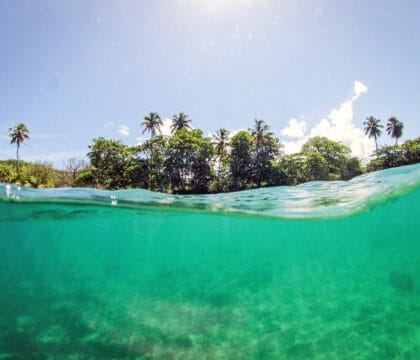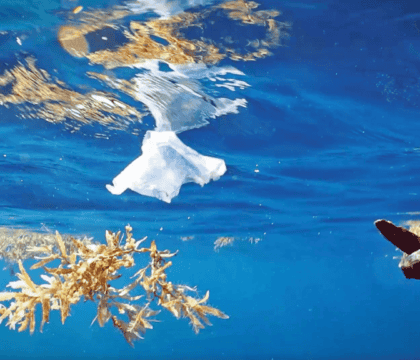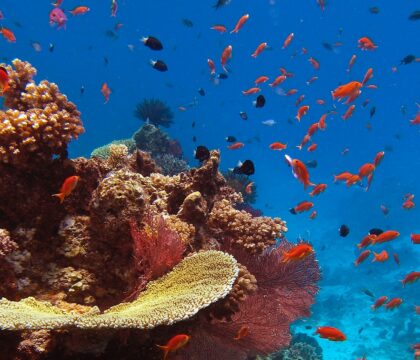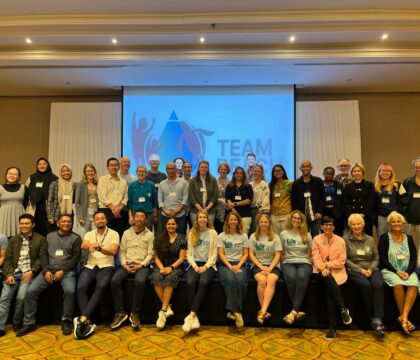July 27, 2022 • News Announcements
Oceanic Society is pleased to announce the launch of our new Traveler Plastic Pollution Offset Program in partnership with Watamu Marine Association in Kenya. Through the program, which is the first of its kind in the travel industry, Oceanic Society will support the removal of an average of 200 pounds of marine litter from the environment for every passenger who joins one of our international nature expeditions.
The plastic removal “offsets” will not only apply to travelers who join future Oceanic Society expeditions, but we have also made the program retroactive to July 1, 2021. 251 travelers joined our expeditions in that time, and we have consequently sponsored the removal of more than 25 tons (50,000 lbs) of marine litter from Watamu’s coastline to-date.
Story Highlights
- For every passenger who joins an Oceanic Society expedition, we will fund four days of beach cleanup effort leading to the removal of an average of 200 lbs of marine litter.
- We expect to contribute to the removal of at least 40 tons (80,000 lbs) of marine litter each year.
- Beach cleanup efforts will take place in Watamu, Kenya, led by the nonprofit Watamu Marine Association.
- The beaches and coast of Watamu, Kenya are home to nesting sea turtles, coral reefs, migrating humpback whales, and more, and cleanup areas include beaches within a Marine National Park and UNESCO Biosphere Reserve.
- All collected debris will be sorted for upcycling, recycling, or proper disposal by our expert local partners who have a long history of success in this community-driven project.

For each Oceanic Society traveler, we will fund four days of cleanup work by a beach cleaner with Watamu Marine Association in Watamu, Kenya, removing an average of 200 pounds of litter from the marine environment.
How the Plastic Pollution Offset Program Works
For every passenger who joins one of our international nature expeditions, Oceanic Society will fund four days of beach cleanup effort by a local beach cleaner trained and employed by Watamu Marine Association. Beach cleaners walk the beaches of Watamu, Kenya in areas where marine litter is known to accumulate and collect any marine litter they encounter, including plastics, discarded fishing gears, glass, and other solid waste. The litter is taken for processing by EcoWorld Recycling in Watamu, an innovative, community-run social enterprise that specializes in sorting, recycling, upcycling, and properly disposing of marine litter. The money that they earn from repurposing waste in this “trash to cash” model supports their employees and is invested back into the effort.

All collected litter will be sorted for recycling, upcycling, or proper disposal by the experts at EcoWorld Recycling.
Each beach cleaner that Oceanic Society supports through this program collects an average of 50 lbs of marine litter per work day, meaning that we will be funding the removal of an average of 200 lbs of marine litter for each traveler on each trip. With 400–450 travelers joining our nature expeditions in a normal year, we anticipate funding the removal of at least 40 tons (80,000 lbs) of marine litter annually.
The Cleanup Site and Community
The cleanup efforts will be led by Watamu Marine Association, a nonprofit organization that employs local women and youth to collect, clean, sort, and recycle/upcycle/dispose of marine litter. The cleanups will take place along the beaches of Watamu, Kenya, a hotspot for marine biodiversity that includes important habitats for birds, sea turtles, whales, dolphins, coral reefs, and more. Beaches cleaned will include those within the boundaries of the Watamu Marine National Park & Reserve, Kenya’s first Marine Protected Area and one of the oldest in Africa.

Beach cleanups will take place in Watamu, Kenya, including within Watamu Marine National Park and Reserve, a hotspot for marine biodiversity.
Beyond its ecological importance, Watamu is a popular nature tourism destination that attracts thousands of international and national visitors each year. The tourism industry is the largest local employer, and keeping Watamu’s coastline clean helps maintain the area’s touristic appeal. Moreover, thanks to Oceanic Society’s Traveler Plastic Pollution Offset Program, Watamu Marine Association will be able to employ multiple full-time beach cleaners year-round. This will free up money that was previously paid out as salary to be reinvested in other community driven sustainability initiatives, such as training local snorkel and dolphin tour guides.
Oceanic Society has been leading safaris in Kenya since the 1970s. We have been working closely with Watamu Marine Association since 2002, even designing our Kenya safaris to visit their facilities so that travelers can learn from community leaders about their unique and innovative projects. Our collaboration with Watamu Marine Association was one reason that our Kenya safaris were named one of National Geographic Traveler’s “50 Tours of a Lifetime” in 2014. Since then, we have continued to build our relationship with Watamu Marine Association, and in 2019 they were the first recipient of funds from our Expedition Impact Fund.
Why Offset Plastic Pollution
Plastic pollution is one of the greatest threats to ocean health worldwide. To address this urgent problem, Oceanic Society encourages people everywhere to pursue solutions to plastic pollution in their daily lives and throughout their spheres of influence. Our Traveler Plastic Pollution Offset Program was created to give our travelers a new way to help fight plastic pollution by supporting the direct removal of marine litter in an ecologically and touristically important area. While it does not in any way negate our personal responsibility to reduce plastic pollution, it does help our travelers to extend their impact to an important ocean area and a community in need. Moreover, this inspiring project supports human livelihoods with practical solutions that aim to solve the globally overwhelming issue of marine litter. In the coming years, we hope to expand this program beyond Kenya to cover other marine areas that our travelers visit.

Watamu Marine Association and EcoWorld are community-led initiatives that not only clean the coast, but also provide local employment through a unique “trash to cash” model.
About Oceanic Society Expeditions
Established in 1969, Oceanic Society is America’s oldest 501(c)(3) nonprofit organization dedicated to ocean conservation. Our expeditions have been a core component of how we pursue our mission for 50 years. Each trip is designed with the intention to positively impact the natural areas and human communities we visit while also delivering a transformative nature experience for our travelers that deepens their connection to nature and promotes the adoption of ocean-friendly “Blue Habits.” Moreover, any profits we earn are invested directly into our ocean research and conservation programs worldwide. Our Traveler Plastic Pollution Offset Program adds a new dimension to our existing conservation travel model, helping our travelers to see and understand the tangible benefits of traveling with Oceanic Society.




